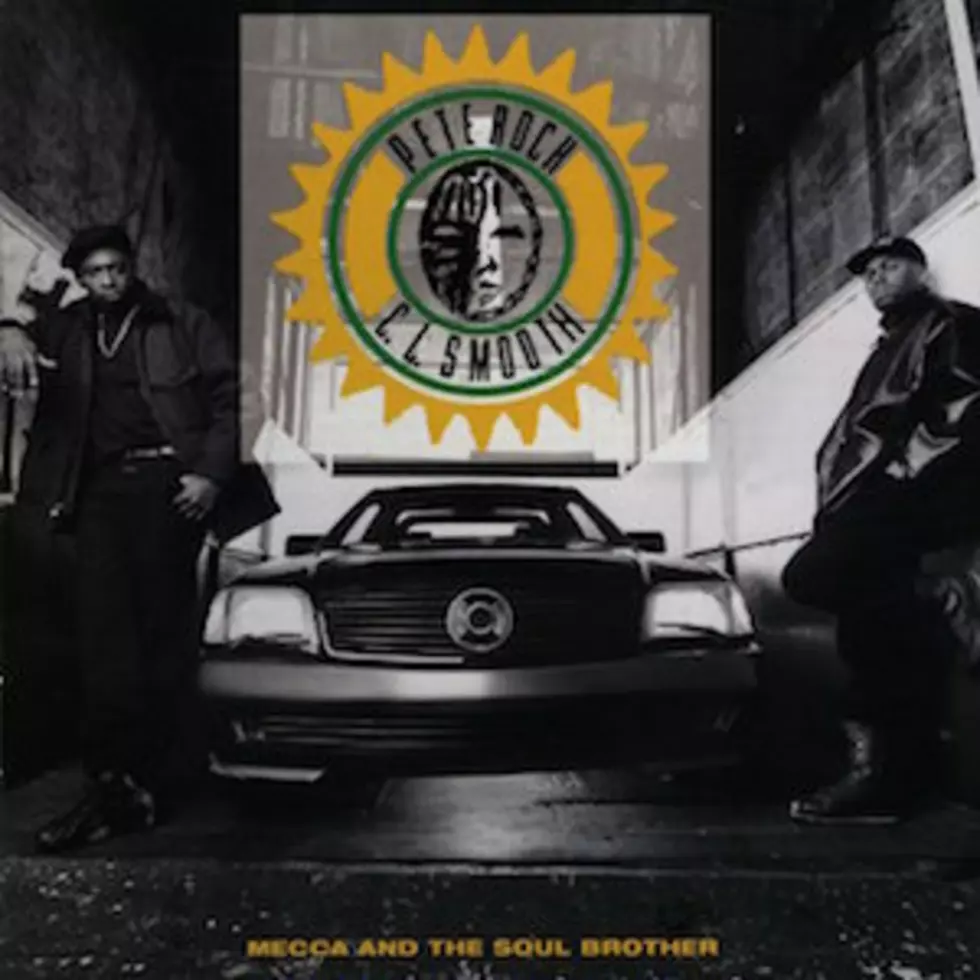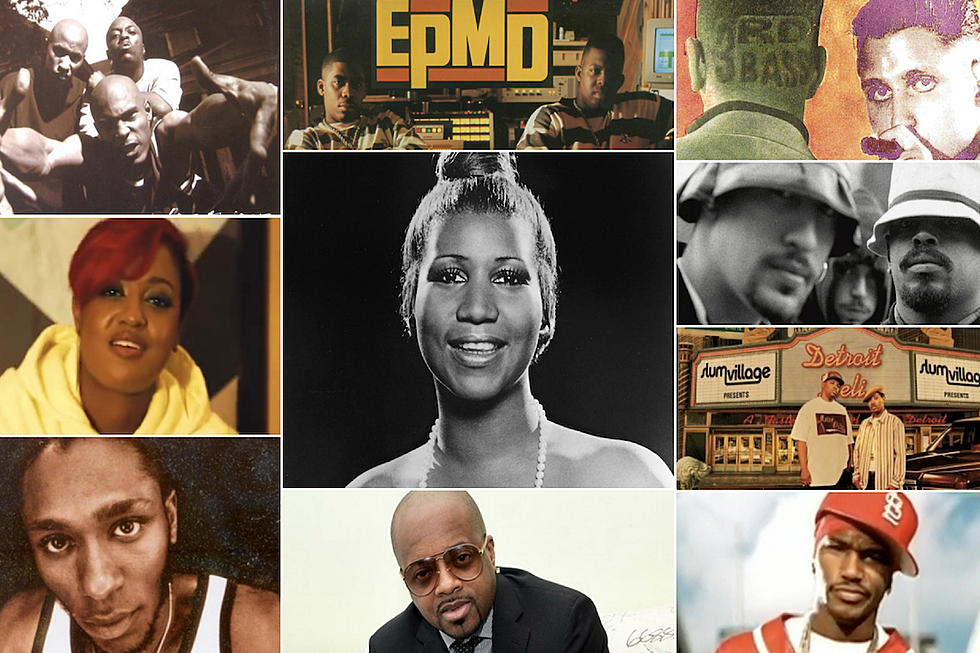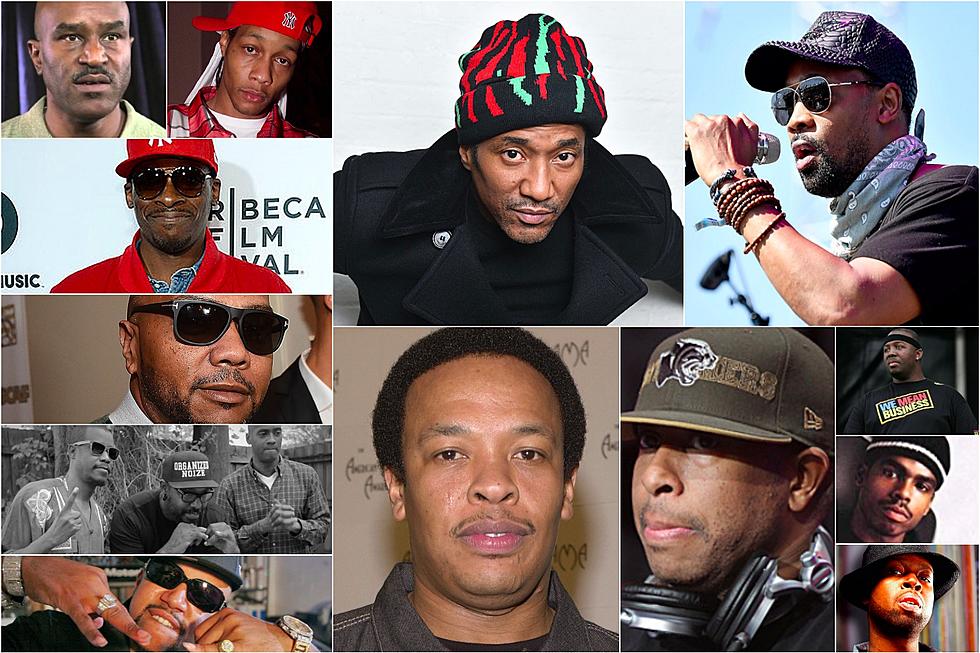
They Reminisce: Pete Rock & C.L. Smooth’s ‘Mecca and the Soul Brother’ Turns 25
“I want people to focus first on the tracks...”
That was what a 24 year old Corey “CL Smooth” Penn told the Source back in 1992, when he was asked what he thinks audiences would be into from Mecca and the Soul Brother, the debut album from Pete Rock and CL Smooth. CL and Peter “Pete Rock” Phillips were two hungry hip-hop fiends from Mt. Vernon, New York who’d been clawing their way up through the industry ranks for years. And now was their moment to step into the spotlight. The young CL actually took the moment to play up his producer partner's musicality--but then made sure to remind everyone of that music's themes.
“They will be able to understand the lyrics more down the line as they play it,” CL added in that Source interview. “I think they’ll be much more attracted to the realism of it. Because, basically we talk about things that could happen to anybody. Something that goes on feeling [like] more than just basic fantasy. The beat will draw them into the lyrics because they’re [intertwined.] You can’t appreciate one without the other.”
And that was the way the world would come to know Pete Rock and CL Smooth, one of hip-hop’s most famed—if famously short-lived—classic-era duos. Before Pete Rock would go on to become one of the game’s most revered producers and CL drifted out of the spotlight, the duo’s connection seemed organic; CL with the slick rhymes and Pete Rock with the dope beats. Rock was the younger cousin of hip-hop star Heavy D, and at 17, he'd studied at the feet of superproducer Marley Marl at WBLS.
“When Hev made it and became a superstar, he took me under his wing,” Pete told SPIN in 2016. “I met all these producers I used to love like Rick Rubin and Teddy Riley. It made me want to get into music and produce.”
Peter was born in the Bronx but moved to Mt. Vernon as a youngster. Teenaged Pete and CL had become friends at Mt. Vernon High (they attended along with future R&B star Al B. Sure!), and Rock’s production work, plus their association with established hitmakers like Marley Marl and Heavy D helped land them a deal with Elektra Records, which released their debut EP All Souled Out in 1991.
Rock’s reputation began to grow by leaps and bounds over the course of a year. The soon-to-be superproducer was still in the early stages of what would become a legendary career when he began crafting Pete Rock & CL Smooth’s debut album; a release that would only affirm his ascension to the genre's top ranks. He’d co-produced tracks on Heavy D & the Boyz’s Big Tyme back in 1989 and was mentored by Eddie F of the Boyz in the years leading up to All Souled Out. But after a star-making remix of Public Enemy’s “Shut ‘Em Down” and a request to work with Run-D.M.C. on their upcoming album (1993s platinum-selling Down With the King), Rock was already on the fast track to greatness.
“We’ve taken it from nothing and made it into something,” CL would explain to the Source regarding their emergence as a formidable duo. “We went from pause button to 4-track, to 8-track, to 24-track, to 48-track. The thing that makes us so compatible is both of our skills grew together. His beats have made me a better rap artist, and my raps have made him a better producer. It’s great that we have family in the business already such as [Grand] Puba and Heavy D, they really sat back and let us develop. We basically helped ourselves, but Eddie F did point us towards the right direction.”
As the world would soon come to understand, Pete Rock’s future lay in his ability to repurpose the past. More than just grabbing popular James Brown loops or jazz breaks, Rock had an ear that connected great Black music of yesteryear to hip-hop’s tradition in a way that amplified the organic connections between it all. It was the soul of their sound.
“My record collection started through my [father’s],” Rock told Nah Right in 2013. “I got a lot of stuff for Mecca and the Soul Brother [from there]. I used a lot of his jazz stuff. He had Kool & the Gang 45s. Mounds of 45s, which are mine now. Rest in peace. He had everything. Jazz, rock, soul, and especially reggae, because we’re Jamaican.”
Rock’s early brilliance and CL’s writing skills would come into full bloom on their debut studio album, Mecca and the Soul Brother. Classic soul and jazz samples define the album, both as the sonic fuel for the songs and as the fleeting intermissions that tie the whole thing together thematically. It’s a brilliantly realized album that announced Pete Rock and CL Smooth as standard-bearers for 90s hip-hop.
The album opener, “Return of the Mecca,” is as stripped and straightforward as 90s East Coast boom-bap gets; with CL spitting verses over a percussive loop of the oft-sampled drums from Mountain’s “Long Red” with a hook lifted from Cannonball Adderley and a ghostly flicker of saxophone from “Today” by Tom Scott and the California Dreamers that would be used to much more impactful effect later on the album.
One of the album’s jazzier tracks, “For Pete’s Sake” is another showcase for CL Smooth’s fluid raps over an absolutely perfect Pete Rock track—built on a sample of Freddie McCoy’s “Gimmie Some” over drums from “Synthetic Substitution” by Melvin Bliss. The duo's perspective veers into much more explicitly topical territory with “Ghettos of the Mind,” as CL raps about the struggles of the streets: “Killin' my own people, I put 'em out of order/Just like the liquor store scene on every corner/I'm tryin' but the kids keep cryin', and the bullets keep flyin'/Look, a boy, he's on the curb just dyin'”
Looping a brief snippet of the outro from the Ohio Player’s cover of “What’s Going On,” and adding soft synth touches and vocals from Terri Robinson and Tabitha Brace, Pete Rock’s production skills are expertly highlighted on “Lots of Lovin.’” The romantic ode to an object of CL’s affection, the semi-ballad is another album high point and was one of the pair's most noteworthy singles. But the smoothed-out vibes don’t last for long, as “Act Like You Know” is another slice of East Coast hardcore; as CL shows of his knack for effortless wordplay: “Straight from the heart I frame the art/Tune up my class, real fast, very smart/Dictate the technique, wait a minute, I speak/Loved by my son and a kiss on the cheek/Stutter-step the concept, blueprint, or pro/Steady as we go--so act like you know”
“Straighten It Out” remains one of the greatest songs in Pete Rock and CL Smooth’s repertoire. The funky drums (from Simtec & Wylie’s “Bootleggin’”) carry distinctively chiming horns (courtesy of “Kool and the Gang’s 1969 track “Chocolate Buttermilk”) on the hook and a brief portion of “Our Generation” by Ernie Hines.
The duo’s sociopolitical perspective informs the spirit of the album, and “Anger In the Nation” features CL turning his focus towards South Africa and the U.S. military, while also dropping his take on history and how it pertains to Africans. “To elevate the Black man is vital,” he declares, with a heavy backdrop courtesy of James Brown’s “Funky President” and an intro from Adofo Abdullah Muhammad.
For all of Mecca and the Soul Brother's consistent brilliance, there's no guessing as to what track serves as the album's centerpiece. There are very few hip-hop records as ubiquitous and revered as “They Reminisce Over You.” The song’s history is well known: crafted as a tribute to Troy “Trouble T-Roy” Dixon of Heavy D & the Boyz, who’d died in a freak fall while on the road back in 1990. Pete and CL wanted to show love to their friend from Mt. Vernon, and the duo delivered a heartfelt ode to motherhood, nostalgia and their fallen comrade. Utilizing the aforementioned “Today” sample, (but featured much more prominently than on “Return of the Mecca”), CL paid tribute to family and community.
“When I date back I recall a man off the family tree/My right hand poppa doc I see/Took me from a boy to a man so I always had a father/When my biological didn’t bother,” he rhymes, and later paying homage to Troy. “Take the first letter out of each word in this joint/Listen close as I prove my point/T to the r-uh-o-y, how did you and I meet?/In front of Big Lou’s, fighting in the street/But only you saw what took many time to see/I dedicate this to you for believing in me.”
It was an emotional track that would become a hip-hop classic. “It’s hard making anything when someone you know and love passes away, but that’s where the inspiration is drawn from deep in your soul and the love or respect you have for that someone helps you say the right things,” CL explained to DubCNN in 2013.
“I was kind of depressed when I made it,” Pete Rock recalled in an interview with the Village Voice in 2007. “And to this day, I can’t believe I made it through, the way I was feeling. I guess it was for my boy. When I found the record by Tom Scott, basically I just heard something incredible that touched me and made me cry. It had such a beautiful bassline, and I started with that first. I found some other sounds and then heard some sax in there and used that. Next thing you know, I have a beautiful beat made. When I mixed the song down, I had Charlie Brown from Leaders of the New School in the session with me, and we all just started crying.”
“On and On” opens with Grap Luva (Pete’s younger brother) playfully rhyming and the sound of friends freestyling in a cypher, before another hard-hitting beat sets things off proper. “It’s Like That” is another standout on an album stuffed with brilliance; with an Elephant’s Memory sample carrying things as CL spits, “Prepare yourself to catch a verse from the big purse/Rotate the megahertz, where you heard it first/The perpendicular, said none similar/Quadruple any figure, quick on the trigger.”
The moody “Can’t Front On Me” is one of Pete Rock’s best productions, (a mishmash of samples from Dave Wintour, Alyn Ainsworth, Tyrone Washington and the Five Stairsteps), CL Smooth delivers some of the best rhymes on Mecca and the Soul Brother.
“The brother on the cover, yes, a rapper not a singer/If you recognize him, point with your index finger/Shock another flock when I hit the block/God or Devil on the set that's level, labeled as a rebel/In retrospect I detect those incorrect/And reflect the black power project/Supreme cuz I chose to never blaspheme/Going to the extreme, place it on a very high beam…”
“The Basement” is an upbeat posse cut that features Rob-O, Grap Luva and Deda--with Heavy D himself delivering an assist as the established superstar in the booth. “I walk the streets in peace and I'm never strapped/But I know a crew of Young Gunz that'll send you back," rhymes the Overweight Lover. "So easy does it on the DL/Peace to Pete Rock, and the Mecca Don CL.”
A slowed down bassline from Talking Heads’ classic “Once In A Lifetime,” with a hook courtesy of the Skull Snaps’ “Trespassin’” and standbys James Brown and Bob James sets things off on “If It Ain’t Rough,” It Aint’ Right,” a fitting title for a track that once again goes directly to the heart of no frills booming beats.
Grand Puba shows up for the album closer, “Skinz,” and the emcee (who’d just defected from Brand Nubian for a solo career) provides one of several scene-stealing guest appearances throughout the 1990s. On an album that had heretofore gone in a decidedly non-hedonistic direction, Mecca and the Soul Brother closes with one of Pete Rock and CL Smooth’s more lecherous tracks. Of course, Puba is right at home: “I rock the world over big booty girls/Won't hit the skinz if she gotta jheri curl/Cause when I jump into my thing I make the bedspring sing/And you can ask my old fling, who's the bedroom king?”
Released on June 9, 1992, Mecca and the Soul Brother wouldn’t be the commercial smash that Pete Rock would enjoy with some of his more high-profile collaborations. But the album met with widespread critical acclaim and singles were in steady rotation on hip-hop radio as well as national video shows like Yo! MTV Raps and Rap City, raising the duo's profile. 25 years later, the album stands as 90s rap pillar; one of the East Coast’s last truly great albums before the commercial success and G'd up aesthetic of Death Row Records shifted hip-hop’s focus to the West Coast. Over a span of nine months, A Tribe Called Quest (The Low End Theory), Gang Starr (Daily Operation) and now Pete Rock & CL Smooth had carved out a new identity for non-commercial East Coast hip-hop; one that would come to define the genre’s ethos in the coming years via a wide range of acts from Camp Lo to Mos Def.
And Mecca and the Soul Brother would come to represent a semi-pinnacle for Pete Rock & CL Smooth. The duo would drop the critically acclaimed follow-up The Main Ingredient in 1994, but the album wouldn’t fare as well as its predecessor commercially. And while Pete Rock had become one of hip-hop’s most in-demand producers, his relationship with his partner was fraying. The Main Ingredient arrived after the Notorious B.I.G. and Wu-Tang Clan changed the image and presentation of East Coast hip-hop; and the shift in focus only added to the strain.
In a 2008 interview with Todd Davis of Riotsound, Rock reflected on how things deteriorated between him and CL.
“We kind of went our separate ways,” Rock shared. “We just didn’t get along at a certain part in our career. The maturity levels were uneven and I felt like, you know, all I wanted to do was music and just keep doing that. That’s all I was focused on. That’s all I cared about. You know, we just saw differences in each other. And the record label had a lot to do with splitting us up. When Sylvia Rhone came into play it was all difficult. It went from all angles ‘cause she dropped INI, she dropped me and CL, and from then on I just kept it moving and kept doing what I had to do to keep doing music.”
“We were two guys who listened to each other,” CL told SPIN. “We’d listen to music, vibe with it, talk about what we were getting from it. Pete was always very courteous–‘Do you like that?’–or, he’d come to me with an idea all ready. ‘You know, I saw you with that nice mink coat the other day. Here’s the music that I made from it.’ He’d listen to what I had to say. That’s a process that’s easy to take for granted.”
But once that was over, it was over. CL admitted that he initially had trouble moving on.
“The breakup bothered me to the point where I fell out of love with music,” he says. “I had to get a spark from somewhere else, and that spark was living my life. Once I started to live my life and get adapted to my children growing up, learning how to communicate with them, it gave me a reality check on what what was lacking in my life. It helped me understand how I lost my rap group: communication.”
Pete Rock and CL would occasionally reunite in the 2000s, much to the delight of fans who loved what they’d done together in their heyday. Rock’s lengthy resume now includes work with Nas, the LOX and a host of others, but it’s the legacy of Mecca and the Soul Brother that still kick-started and still defines so much of who he is. And for CL Smooth, he can now look back with fondness at what he and his old friend were able to create.
“We where ahead of our time and when you look back on it now it shows even more!” CL shared with DubCNN. “Pete’s beats were amazing, his arrangements were ingenious, and my vocals and lyrical delivery were so precise; as well as the content, so deep. It’s still bananas!”
Check Out the Video for Pete Rock & CL Smooth's "Lots of Lovin'":
Check Out the Video for Pete Rock & CL Smooth's "Straighten It Out":
Check Out the Video for Pete Rock & CL Smooth's "They Reminisce Over You":
See 100 Hip-Hop Facts That Will Blow Your Mind
More From TheBoombox








![Pete Rock and Smoke DZA Drop Flashy Visuals for ‘Black Superhero Car’ Featuring Rick Ross [WATCH]](http://townsquare.media/site/625/files/2017/01/rickross.jpg?w=980&q=75)
